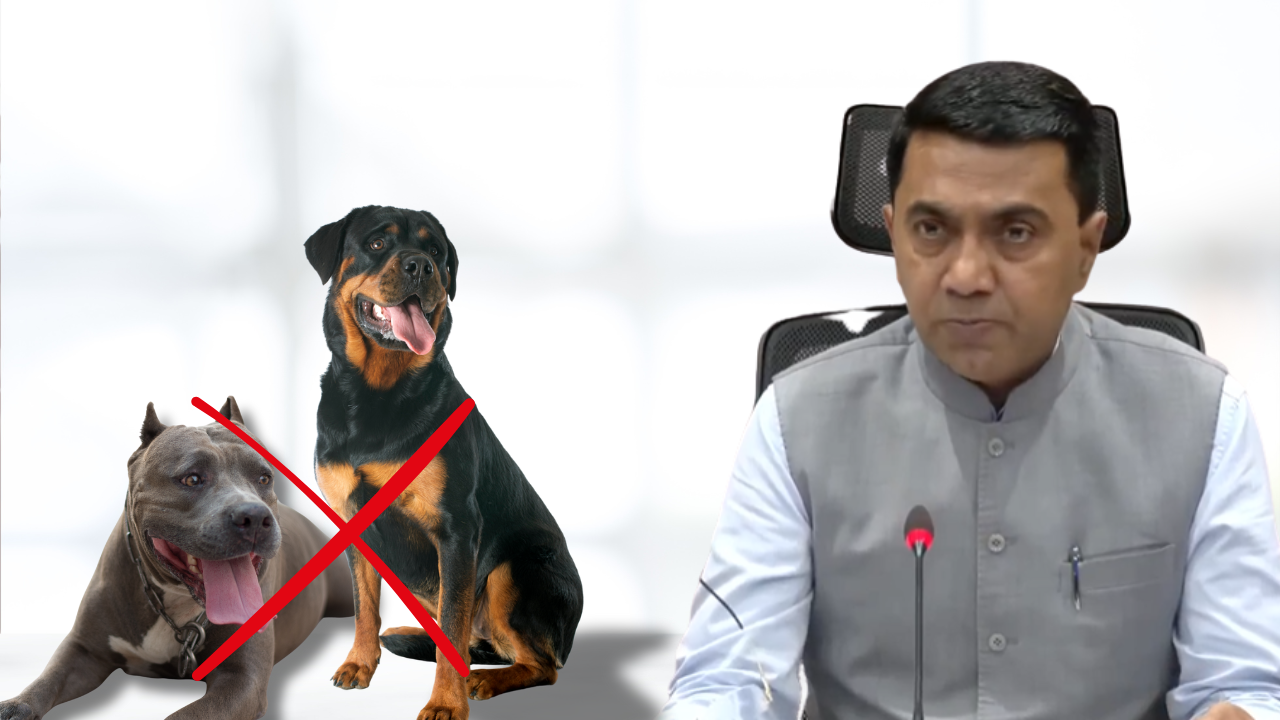
PANAJI: The Goa Cabinet has approved the Goa Animal Breeding and Domestication (Regulation and Compensation) Bill, 2025, which proposes a ban on the import, sale, and breeding of aggressive dog breeds such as pitbulls and rottweilers. The bill will be introduced in the upcoming session of the Goa Legislative Assembly.
Speaking to reporters after the Cabinet meeting today, Chief Minister Pramod Sawant said, “The bill has been cleared by the Cabinet and will be placed before the Assembly. It aims to regulate animal breeding, ensure safety, and provide for compensation in case of incidents involving domesticated animals.”
The move aligns with a central government directive issued last year banning the import, sale, and breeding of 23 “ferocious” dog breeds considered dangerous to human life. These include Pit Bull Terrier, Rottweiler, American Staffordshire Terrier, Dogo Argentino, Tosa Inu, Boerboel, Cane Corso, Kangal, and Akita, among others. The Centre also called for strict enforcement of the Dog Breeding and Marketing Rules, 2017, and the Pet Shop Rules, 2018, following a spate of dog attack incidents nationwide.
In Goa, such incidents have raised alarm. In August 2023, a seven-year-old boy was mauled to death by a pit bull in Anjuna. In another case, a Rottweiler attacked two minor children in Taleigao. Most recently, in January this year, a resident of Assagao was arrested after his unleashed Rottweiler attacked a neighbour.
Among other key decisions, the Cabinet approved the renaming of the River Navigation Department as the Department of Inland Waterways. “The River Navigation Department will now be known as the Department of Inland Waterways,” said Sawant, adding that the change would help streamline operations and promote water-based transport systems in the state.
Addressing ongoing unrest among taxi operators, the Chief Minister assured that all concerns would be resolved amicably. “We want the taxi business to run smoothly and tourism also to flourish, so no one should try to create confusion. All issues will be addressed,” Sawant said.
The Cabinet also cleared several land transfer proposals, including 2,400 square metres of government land in Porvorim for the construction of an Ambedkar Bhavan, and 800 square metres in Tuem for the Ministry of Health and Family Welfare to set up a Non-Communicable Disease Screening (NCDS) centre at the local community health facility.
On the Tribal Bhavan project, Sawant clarified that there are no government-level hurdles apart from a legal dispute. “The matter is currently in court following claims by two Scheduled Tribe associations over land ownership,” he said.
The Cabinet also approved the formation of a dedicated State NSS Cell (National Service Scheme) to strengthen volunteerism and youth development initiatives. “A separate State NSS Cell will be established, and recruitment will be done accordingly,” Sawant announced. The cell will function as a nodal agency for NSS activities in the state.
In the health and education sectors, the Cabinet gave its nod to the recruitment of 170 medical professionals, including surgeons, gynaecologists, anaesthetists, paediatricians, and nurses, on a contractual basis under the Directorate of Health Services. It also approved the creation of new posts in the Goa Dental College, the Directorate of Prosecution, the Department of Environment and Climate Change, and the Startup Promotion Cell. Additionally, the appointment of an embryologist at Goa Medical College’s Department of Obstetrics and Gynaecology was sanctioned.
Lastly, the Cabinet approved a Memorandum of Understanding (MoU) with UNOCUE and Nobel Association to implement Goa Career Navigator, a career guidance initiative for Class 12 students across all 12 talukas. Developed by the Goa SCERT, the initiative includes AI-generated career reports, psychometric testing, and structured parent involvement. “The initiative is aligned with the National Education Policy and will help students understand various career options beyond the traditional streams,” Sawant said. The programme will run for an initial period of three years.